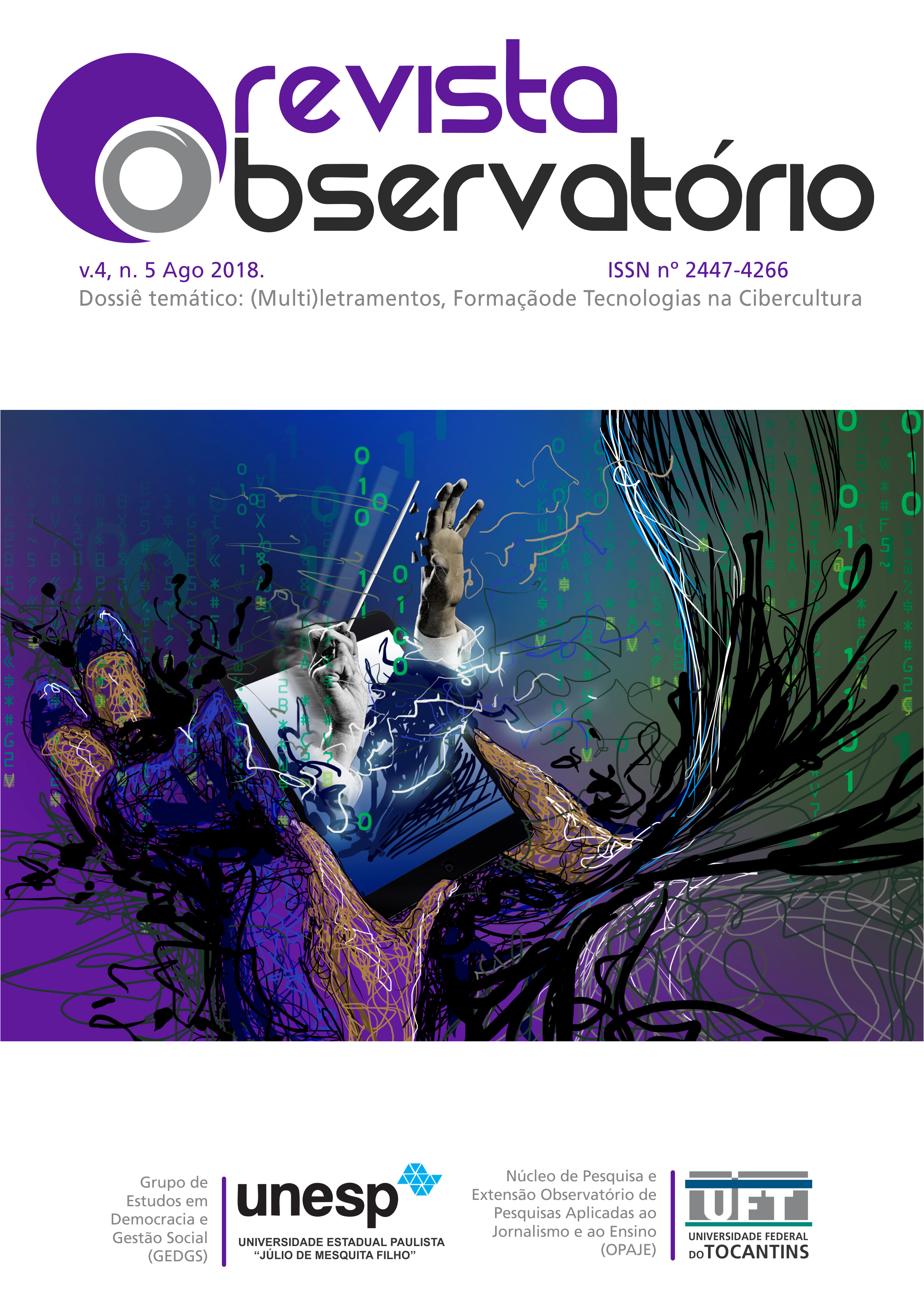THE WHATSAPP APPLICATION IN DIGITAL LETTERING EDUCATIONAL CONTEXTS
DOI:
https://doi.org/10.20873/uft.2447-4266.2018v4n5p45Keywords:
Digital literacy, Whatsapp, Interaction, Online trainingAbstract
This article aims to enrich the discussion about the use of mobile devices (m-learning) in educational contexts of digital literacy. It presents an experience report about the use of the Whatsapp application in the process of learning and interaction between the servers of the Federal University of Tocantins, students in module 1 - Getting to know its university of the Integration Course of the server in UFT 2016. Whatsapp was used as a Learning environment in activity 3 of this module. Although there was initial resistance from some students to the proposal, the results were positive. The text also contemplates the difficulties found in this experience in order to contribute to new studies that contemplate mobile technologies in education.
Downloads
References
ALMEIDA, M. E., & VALENTE, J. A. Tecnologias e curículo: trajetórias convergentes ou divergentes. São Paulo: Paulus, 2011.
BERE, A. A comparative study of student experiences of ubiquitous learning via mobile devices and learner management systems at a South African university. Proceedings of the 14th Annual Conference on World Wide Web Applications. Durban, 7-9 November 2012.
CHANG, C.Y.; SHEU, J.P. & CHAN, T.W. Concept and design of ad hoc and mobile classrooms. Journal of Computer Assisted Learning, nº19, 2013. Disponível em http://chan.lst.ncu.edu.tw/publications/2003-Chang-cad.pdf. Acesso em 22 de fev. 2017.
CHARTIER, R. Do códex à tela: as trajetórias do escrito. In: CHARTIER, R. A ordem dos livros: leitores, autores e bibliotecas na Europa entre os séculos XIV e XVIII Brasília: UNB, 1994.
CHURCH, K. & OLIVEIRA R. What's up with Whatsapp?: comparing mobile instant messaging behaviors with traditional. Actas of MobileHCI '13 Proceedings of the 15th international conference on Human-computer interaction with mobile devices and services, Monique Germanes, 2013, p. 352-361. Disponível em http://www.ic.unicamp.br/~oliveira/doc/MHCI2013_Whats-up-with-Whatsapp.pdf. Acesso em 13 fev. 2017.
GOMES, M. J. Reflexões sobre a adopção institucional do e-learning: novos desafios, novas oportunidades. E-curriculum, n.2 200
IBGE, I. B. Pesquisa Nacional por Amostra de Domicílios – PNAD, 2015. Rio de Janeiro: IBGE.
JISHA K. JEBAKUMAR D. Whatsapp: A Trend Setter in Mobile Communication among Chennai Youth. IOSR Journal Of Humanities And Social Science Volume 19, Issue 9, (Sep. 2014), Disponível em http://iosrjournals.org/iosr-jhss/papers/Vol19-issue9/Version-7/A019970106.pdf . Acesso em 23 jan. 2017.
JONASSEN, D. Computers in the classroom: Mindtools foCritical Thinking. Englewood Cliffs: Merril, 1996.
LOPES, M. d. (2013). Literacia Digital Dos Professores do 2º E 3º Ciclos das escolas do Conselho Viseu. Lisboa: Universidade Católica Portuguesa.
YEBOAH J. EWUR D. G. The impact of Whatsapp messenger on students performance in Tertiary institutions in Ghana, Journal of Education and practice, Vol.5, No.6, 2014. Disponível em http://www.iiste.org/Journals/index.php/JEP/article/view/11241. Acesso em 16 fev. 2017.
MANTOVANI, C., & MOURA, M. Informação, interação e mobilidade; Información, interacción y movilidad. Informação & Informação, nº17, volume 2, 2012, p.55-76 .
MOURA, A. Geração Móvel: um ambiente de aprendizagem suportado por tecnologias móveis para a “Geração Polegar”. P. Dias, A. J. Osório (org.) Actas da VI Conferência Internacional de TIC na Educação - Challenges 2009, pp 50 - 78. Disponível em : <http://repositorium.sdum.uminho.pt/bitstream/1822/10056/1/Moura%20(2009)%20 Challenges.pdf.>. Acesso em 10 jun. 2017.
NÓVOA, A. Nada será como antes. Revista Pátio, n. 72, nov.2014. Porto Alegre:
Grupo A. Disponível em <http://loja.grupoa.com.br/revista-patio/artigo/10938/nada-sera-como-antes.aspx >.Acesso em 22 jul. 2017.
RIYANTO, A. English Language Learning Using ‘Whatsapp’ Application, 2013. Disponível:em <https://akhmadriyantoblog.wordpress.com/2013/07/21/english-language-learning-using-whatsapp-application/>. Acesso em 23 jan. 2017.
SANTAELLA, L. A ecologia pluralista da comunicação: conectividade, mobilidade, ubiquidade. São Paulo: Paulus, 2010.
____________. Desafios da ubiquidade para a educação. Revista Ensino Superior Unicamp, 2013, p.19-28.
SANTOS, E. Pesquisa-Formação na Cibercultura. Lisboa: Whitebooks,2014.
SERRES, M. A polegarzinha: uma nova forma de viver em harmonia e pensar as instituições, de ser e de saber. Rio de Janeiro: Bertrand Brasil, 2013.
SILVA, B. D., & CONCEIÇÃO, S. C. Desafios do B-learning em tempos de cibercultura. In: M. E. Almeida, P. Dias, & B. D. Silva, Cenário de Inovação para a educação na sociedade digital. São Paulo: Loyola, 2013, pp. 137-161.
SOARES, M. Novas práticas de leitura e escrita: Letramento na cibercultura. Educ. Soc., nº23, 2002, pp.143-160.
UNIVERSIDADE FEDERAL DO TOCANTINS (UFT), Curso de integração do Servidor 2016. Apostila Módulo 1 – Conhecendo a Universidade. UFT, 2016.
WILLIAMS, R. L. Preciso saber se estou indo bem: uma história sobre a importância de dar e receber feedback. Rio de Janeiro: Sextante, 2005.
Downloads
Published
How to Cite
Issue
Section
License
[PT] Autores que publicam nesta revista concordam com os seguintes termos:
1. Autores mantém os direitos autorais e concedem à revista, sem pagamento, o direito de primeira publicação, com o trabalho simultaneamente licenciado sob a Creative Commons Attribution License (CC BY-NC 4.0), permitindo o compartilhamento do trabalho com reconhecimento da autoria do trabalho e publicação inicial nesta revista.
Leia todos os termos dos direitos autorais aqui.

